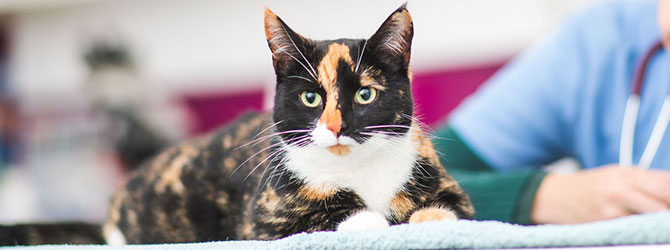Constipation in cats: symptoms, causes, and treatment
Constipation in cats is a condition where they experience difficulty passing stools or are unable to do so. This issue can vary from having hard, dry stools that are challenging to pass, to a severe state where the stool builds up in the intestines and cannot be expelled, requiring veterinary intervention.
Brief summary
- Constipation involves difficulty or inability to pass stool
- Symptoms include hard, dry stools and straining while pooing
- Causes are diverse, ranging from dietary factors to underlying health conditions.Home remedies can be effective. However, veterinary help is essential in severe cases
Constipation in cats symptoms
- No bowel movement for more than a day
- Frequent but unproductive trips to the litter tray
- Straining when trying to pass a poo
- Tummy appears swollen
- Lethargic
- Not eating well
Read more: Is your cat coughing? Find out the main causes, symptoms and treatment
What causes constipation in cats?
Constipation in cats can result from a variety of causes, including environmental, dietary, and health factors.
Environmental causes
- Cats avoiding the litter tray due to competition from other cats.
- More fastidious cats being put off by a dirty litter box.
- Lack of physical activity.
Dietary causes
- Diet low in fibre.
- Unsuitable diet for the cat’s lifestage.
- Insufficient water intake.
Health-related causes
- Hairballs, especially in long-haired cats.
- Stress affecting bowel movements.
- Swallowing foreign objects that obstruct the intestines.
- Back or joint issues, like arthritis, affecting litter box use.
- Other diseases, including neurological disorders and tumours.
- Kidney issues leading to dryer, harder stools.
Is your cat suffering from constipation or urinary problems?
It's important to distinguish between constipation and urinary tract problems in cats because they can have similar symptoms but need different treatments. If you notice your cat is having trouble in the litter box, pay attention to whether they’re having difficulty passing stools or urinating. Urinary blockages, especially in male cats, can be a serious emergency that requires immediate vet care.
Read more: What's the best treatment for excessive shedding in cats?
When should I see my vet?
Consult your vet if:
- Constipation persists beyond a day
- Your cats seems unwell, such as being very lethargic or not eating
- Underlying health issues are suspected
- Home remedies don't alleviate the condition
How to treat constipation in cats
- Laxatives can help make the stool more watery or easier to pass. A vet should decide the type and amount of laxative.
- Enemas involve putting liquid into the colon through the bottom to help make the stool more watery and to get the bowels moving.
- Some medications can increase the movement and strength of contractions in the intestines, helping with bowel movements.
- In very bad cases where the colon gets too stretched over time and stops working properly, surgery might be necessary. This usually involves removing the affected parts of the colon to prevent serious problems like bacteria spreading from the gut into the bloodstream.
Preventing constipation in cats
Adopting the following preventive measures can significantly lower your cat's constipation risk. However, these do not replace professional veterinary advice, especially if your cat has a history of gastrointestinal problems or other health concerns.
Regular hydration
Ensuring your cat stays well-hydrated is really important. Regular drinks of water keep the stool soft, helping its passage through the intestines. Cats prone to constipation may do better on a wet food than a dry diet.
Avoid indigestible materials
Prevent your cat from swallowing materials like fur, which can lead to blockages. Regular grooming, particularly for long-haired breeds, can reduce fur ingestion.
Clean and accessible litter boxes
Maintain cleanliness and accessibility of litter boxes. Cats may avoid using a dirty or inconveniently placed litter box, increasing the risk of constipation. If you have more than one cat, always make sure that you have more litter boxes than cats, to avoid competition, and place them in different areas around the house.
Balanced diet with suitable fibre
A diet that includes both soluble and insoluble fibre can help food move through the intestines smoothly and prevent constipation. Soluble fibre in foods such as canned pumpkin and psyllium helps the colon contract. Insoluble fibre increases stool size and promotes colonic movement. However, too much fibre can cause diarrhoea and interfere with nutrient absorption, so moderation is important. Speak to your vet about a suitable diet for your cat, especially if they’re prone to constipation.
Monitor for gastrointestinal distress signs
Keep alert for signs of stomach problems, which may indicate early stages of constipation or other digestive issues. Prompt detection and treatment can prevent the condition from getting worse.
Regular veterinary check-ups
Regular visits to the vet are important to check for things that could be causing your cat's constipation, like problems with their nutrition or medication. Members of the Pet Health Club receive two healthy pet checks a year as part of their subscription.
Physical activity
Exercising regularly can help prevent constipation. It works by getting the bowels moving and promoting better bowel function. Encourage your cat to play, especially if they don’t have outdoor access.
Read more: Symptoms and treatment of feline colitis
Any studies into constipation in cats?
One study titled Nutrition and Feline Idiopathic Constipation discovered that feeding cats a diet that includes psyllium, a type of fibre, was highly effective in treating chronic constipation. In this research, 82% to 93% of the cats on the psyllium diet showed complete improvement from their constipation symptoms.
Another study called Retrospective evaluation of risk factors and treatment outcome predictors in cats presenting to the emergency room for constipation found that older, overweight cats and those with chronic kidney disease or a history of constipation are more prone to constipation. It also noted that cats in pain during abdominal exams often respond less well to enema treatments. The study suggests more research to find the best treatments for constipation in emergencies.
A third study explained that constipation in cats is a common problem in cats and is often caused by issues with muscle movement in the colon, dehydration, or diet problems. Cats with constipation might strain to go to the bathroom or stop altogether. Treating it can involve giving them medicine to help them go, changing their diet, or, in serious cases, surgery. Some cats get better with treatment, but others might keep having problems.
Need more advice on constipation?
Contact your vet if you need further advice – they’ll always be happy to help.
Find your nearest vet using our Find a Vet page, or speak to a vet online using our video vet service.


